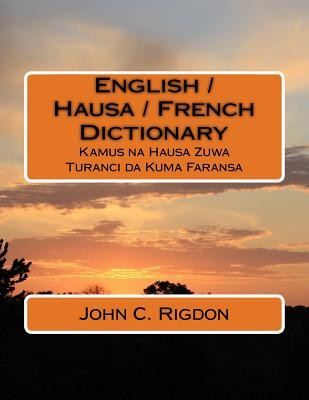
- We will send in 10–14 business days.
- Author: John C Rigdon
- Publisher: CreateSpace Independent Publishing Platform
- ISBN-10: 1974088081
- ISBN-13: 9781974088089
- Format: 21.6 x 27.9 x 2.1 cm, softcover
- Language: English
- SAVE -10% with code: EXTRA
Reviews
Description
Hausa is one of Africa's single most spoken languages. It is Hausa's general ease of use that has contributed to its becoming so widely used. A member of the Chadic branch of the Afro-Asiatic languages Hausa is spoken as a first language by about 34 million people, and as a second language by about 15 million more. Native speakers of Hausa are mostly to be found in the north of Nigeria and in Niger (where it is an official language), but the language is widely used as a lingua franca in a larger geographic band across sahelian Africa north of the Congo basin, and west of central Sudan. As a lingua-franca, Hausa is especially prevalent in Ghana, used by Hausa traders in zango (Hausa urban districts) in major cities. It is also used by Fulani herdsmen, Dagomba/Gurunsi farmers as a second language, by the official Islamic clergy of the country, and as an inter-ethnic group lingua-franca north and east of all Akan dominated areas. In total, Hausa speakers in Ghana number between 4-7 million of all Hausa-speakers, making it a very handy language to know in the marketplace. Hausa is also used extensively in Cameroon alongside Fulani in the far north and as far south as Gabon. In Central/Northeast Africa, Hausa is used in Chad and Sudan among the Hausa-Fulani communities, and smaller Muslim tribal groups, in and around Khartoum and Kordofan (in addition to Arabic). Two famous Sudanese singers, Fadimatu and Sabrin, occasionally sing in Hausa on the popular Sudanese national television program Nogoum, noting the increasing recognition of the Hausa language in otherwise Arabic-dominated Sudanese society. Hausa is a tonal language which employs two distinct tones, high and low, but doesn't sound as distinctly tonal as other African languages. There are also many special implosive and explosive consonants used in Hausa that may have to be learned by ear, but are completely comprehensible without mastering. Hausa employs a 5 vowel system like Spanish (a, e, i, o, u), and grammar is quite easy to learn. This dictionary contains 15,000 terms in French and English paired with 8,600 terms in Hausa. Also included is a guide to English, French and Hausa pronunciation and grammar.
EXTRA 10 % discount with code: EXTRA
The promotion ends in 19d.23:44:59
The discount code is valid when purchasing from 10 €. Discounts do not stack.
- Author: John C Rigdon
- Publisher: CreateSpace Independent Publishing Platform
- ISBN-10: 1974088081
- ISBN-13: 9781974088089
- Format: 21.6 x 27.9 x 2.1 cm, softcover
- Language: English English
Hausa is one of Africa's single most spoken languages. It is Hausa's general ease of use that has contributed to its becoming so widely used. A member of the Chadic branch of the Afro-Asiatic languages Hausa is spoken as a first language by about 34 million people, and as a second language by about 15 million more. Native speakers of Hausa are mostly to be found in the north of Nigeria and in Niger (where it is an official language), but the language is widely used as a lingua franca in a larger geographic band across sahelian Africa north of the Congo basin, and west of central Sudan. As a lingua-franca, Hausa is especially prevalent in Ghana, used by Hausa traders in zango (Hausa urban districts) in major cities. It is also used by Fulani herdsmen, Dagomba/Gurunsi farmers as a second language, by the official Islamic clergy of the country, and as an inter-ethnic group lingua-franca north and east of all Akan dominated areas. In total, Hausa speakers in Ghana number between 4-7 million of all Hausa-speakers, making it a very handy language to know in the marketplace. Hausa is also used extensively in Cameroon alongside Fulani in the far north and as far south as Gabon. In Central/Northeast Africa, Hausa is used in Chad and Sudan among the Hausa-Fulani communities, and smaller Muslim tribal groups, in and around Khartoum and Kordofan (in addition to Arabic). Two famous Sudanese singers, Fadimatu and Sabrin, occasionally sing in Hausa on the popular Sudanese national television program Nogoum, noting the increasing recognition of the Hausa language in otherwise Arabic-dominated Sudanese society. Hausa is a tonal language which employs two distinct tones, high and low, but doesn't sound as distinctly tonal as other African languages. There are also many special implosive and explosive consonants used in Hausa that may have to be learned by ear, but are completely comprehensible without mastering. Hausa employs a 5 vowel system like Spanish (a, e, i, o, u), and grammar is quite easy to learn. This dictionary contains 15,000 terms in French and English paired with 8,600 terms in Hausa. Also included is a guide to English, French and Hausa pronunciation and grammar.


Reviews